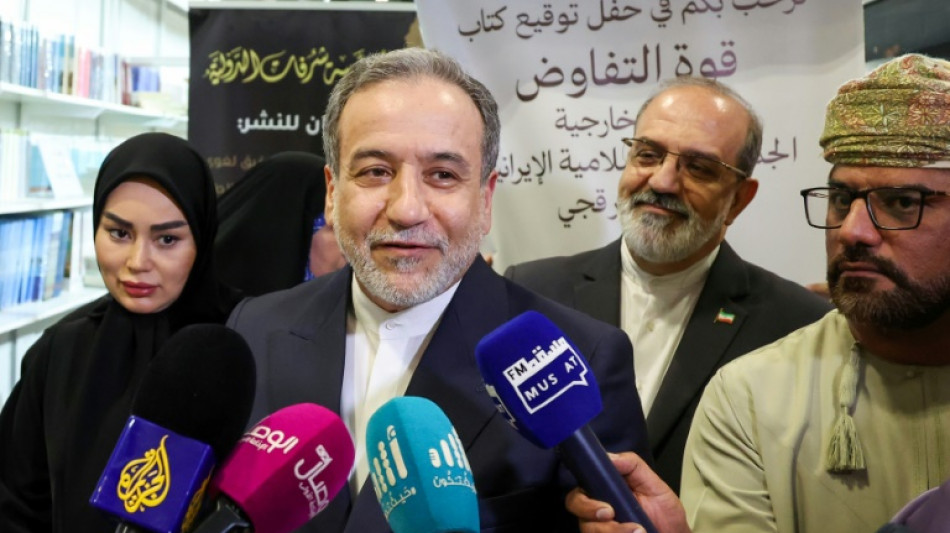

US, Iran say progress in 'positive' nuclear talks
The United States and Iran reported progress in their latest round of nuclear talks on Saturday and agreed to meet again next week as they pursue a deal that could help ease soaring Middle East tensions.
A US official called the talks "positive and productive", and Iran's top diplomat said the two sides will study how to narrow their differences on a range of subjects before next week's fourth round.
The highest-level contact in years between the long-time foes is targeting a new deal that would stop Iran developing nuclear weapons -- an objective Tehran denies pursuing -- in return for relief from sanctions.
"There is still much to do, but further progress was made on getting to a deal," the senior US official said on condition of anonymity, adding that the next talks would be in Europe.
Iranian Foreign Minister Abbas Araghchi called Saturday's talks, which included technical-level teams for the first time, "serious and businesslike".
"There are differences both in the major issues and in the details," he told Iranian state TV.
"Until the next meeting, further studies are to be conducted in the capitals on how to reduce the differences."
Araghchi added: "I think our progress has been good so far. I am satisfied with the process of the negotiation and its speed. I think it is proceeding well and satisfactorily."
US President Donald Trump pulled out of an earlier, multilateral agreement during his first term. The United States and Israel have repeatedly threatened Iran with military strikes.
- 'Minute details' -
US special envoy Steve Witkoff again led the American delegation while Michael Anton, the State Department's head of policy planning, headed the US expert-level negotiators.
Deputy foreign ministers Kazem Gharibabadi and Majid Takht-Ravanchi led Tehran's technical team, according to Iran's Tasnim news agency.
The delegations were in separate rooms and communicated in writing via the hosts, Iranian foreign ministry spokesperson Esmaeil Baqaei and Araghchi said.
"The expert and technical talks... reached the stage of minute details about mutual demands and expectations," an Iranian state TV reporter said.
Iran's defence and missile capabilities were not discussed, Baqaei told state TV, while an Iranian negotiator said the talks were "uniquely about sanctions and nuclear questions", according to Tasnim.
Araghchi had earlier expressed "cautious optimism", saying this week: "If the sole demand by the US is for Iran to not possess nuclear weapons, this demand is achievable".
The talks coincided with a major blast at Iran's Shahid Rajaee port that injured hundreds of people and killed at least four, state media reported.
The port's customs office said it probably resulted from a fire in a storage depot.
Before the talks, Trump, in an interview published Friday by Time magazine, reiterated his threat of military action if a deal fell through.
But he added that he "would much prefer a deal than bombs being dropped". The talks began in Muscat a fortnight ago and continued in Rome last Saturday.
- Trump's 'maximum pressure' -
They are the most senior engagement between the traditional enemies since 2018, when Trump withdrew from the landmark 2015 accord that gave Iran sanctions relief in return for curbs on its nuclear programme.
Since returning to office, Trump has reinstated his "maximum pressure" policy of sanctions against Tehran.
In March, he wrote to Iran's supreme leader Ayatollah Ali Khamenei proposing talks, but also warning of potential military action if diplomacy failed.
On Tuesday, Washington announced new sanctions targeting Iran's oil network -- a move Tehran described as "hostile" ahead of Saturday's talks.
On Wednesday, UN nuclear watchdog chief Rafael Grossi called on Iran to explain tunnels built near its Natanz nuclear site, seen in satellite imagery released by the Institute for Science and International Security.
Iran currently enriches uranium to 60 percent, far above the 3.67 percent limit imposed by the 2015 deal but still below the 90 percent threshold required for weapons-grade material.
Araghchi has previously called Iran's right to enrich uranium "non-negotiable".
Tehran last year revived engagement with Britain, France and Germany -- also signatories to the 2015 deal -- holding several rounds of nuclear talks ahead of the US meetings.
Last week, US Secretary of State Marco Rubio urged the three European states to decide whether to trigger the "snapback" mechanism under the 2015 agreement, which would automatically reinstate UN sanctions on Iran over its non-compliance.
The option to use the mechanism expires in October.
Iran has warned it could withdraw from the nuclear Non-Proliferation Treaty if the snapback is triggered.
X.Maes--JdB



